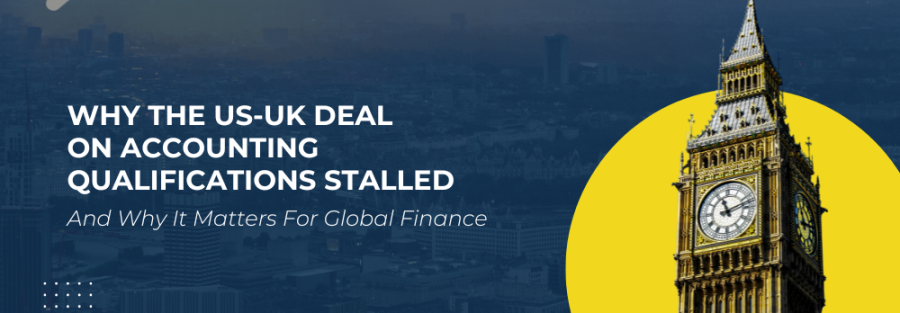Imagine you’re a top accountant working in New York, and your firm suddenly needs you to assist with a big audit in London. You’re qualified, experienced, and trusted by your clients. But there’s one catch, you can’t legally sign off on the work in the UK.
That’s the kind of red tape that the US and UK accounting professions have been trying to cut through for years. A proposed agreement to recognize each other’s qualifications could have opened the doors for smoother collaboration on audits of global companies, especially banks and businesses listed in both countries. Unfortunately, talks have hit a wall.
So, what went wrong? And why should anyone outside the accounting world care?
What Was the Deal About?
The idea was straightforward: allow qualified accountants from the US to work in the UK and vice versa without having to jump through endless hoops.
This kind of agreement, called “mutual recognition,” is common in professions like law and medicine. In this case, it would make it easier for auditors to switch countries, take on international projects, and reduce duplication of work when companies operate across borders.
For big accounting firms, especially the “Big Four” (Deloitte, EY, KPMG, and PwC), it would mean they could move top talent around as needed. That’s especially useful when auditing large, complex clients with operations or stock listings in both the US and the UK.
So Why Did It Stall?
Unfortunately, getting two countries to agree on what counts as a “qualified” accountant is not easy. Here’s why the deal has hit a dead end, for now:
1. Different Standards and Requirements
In the UK, becoming an auditor requires a specific set of experiences and qualifications, often tied to the ability to sign off on company accounts. While the US also has strict licensing standards, its system is more flexible and that became a sticking point.
The UK side wanted assurance that US-trained accountants had gone through enough of the “right kind” of audit work. But the two sides couldn’t agree on how to verify or measure that experience.
2. Oversight and Quality Control Issues
There was also concern about how to monitor and ensure the quality of American accountants practicing in the UK. Regulators couldn’t agree on what kind of oversight was needed to guarantee that foreign professionals met UK standards.
If the oversight system isn’t robust, it could risk public trust, especially when auditors are signing off on billion-dollar businesses.
3. Exclusion of a Major UK Body
Another complication was the US side’s negotiation choices. The American accounting body (AICPA) worked with two UK counterparts, the Institute of Chartered Accountants of Scotland (ICAS) and the ICAEW (Institute of Chartered Accountants in England and Wales).
But they left out ACCA (Association of Chartered Certified Accountants), the second-largest accounting body in the UK. That didn’t sit well with many in the UK, especially since the UK’s audit regulator (the Financial Reporting Council) has the final say and expects any agreement to apply to all professional bodies, not just a select few.
Why This Deal Matters (Even If You’re Not an Accountant)
You might wonder: why does any of this matter to someone not in the accounting world?
Audits Keep the Financial System in Check
Auditors are the watchdogs of the business world. They make sure the financial statements you see as an investor, customer, or employee are accurate. When auditors can’t work efficiently across borders, especially in a global economy, the quality and speed of audits suffer.
Cross-Border Business Needs Cross-Border Talent
In a world where companies operate in dozens of countries, it’s vital that firms can move their experts around freely. Whether it’s a bank with dual listings in New York and London, or a multinational with operations on both sides of the Atlantic, mobility of talent is key.
Delays Can Hurt Global Competitiveness
London wants to remain a top global financial center. Allowing top-tier accounting professionals from the US to work there more freely could bring in expertise and make the city more attractive to international firms. The same goes for US firms wanting access to UK talent.
What’s Next?
Although the pilot agreement between the US and Scotland (launched in 2018) was extended twice, it finally lapsed quietly in 2024. Talks haven’t officially ended, but they are now “suspended,” according to insiders.
Still, there’s hope. The UK government has suggested updating legislation (like the Companies Act) to allow more flexibility in recognizing foreign audit experience. That would make it easier to restart the talks and possibly reach a broader agreement that includes all UK accounting bodies.
Big firms are pushing for this too. Their argument is simple: audits of big, global companies are too complex to be handled entirely within national borders. If the right expertise exists, whether in New York or Glasgow, it should be possible to use it wherever it’s needed.
Conclusion
This stalled agreement might sound like a niche problem, but it reveals a bigger challenge in global business: how to balance local standards with global cooperation.
There’s a clear need to modernize how we think about professional qualifications in a world where business doesn’t stop at the border. While safety and quality must come first, especially in a profession like auditing, there’s also a need for common ground.
With continued dialogue and a bit more flexibility, the US and UK might yet reach a deal that helps accounting professionals, and the companies they serve, thrive in a truly global economy.





